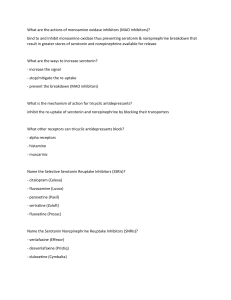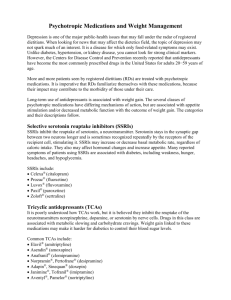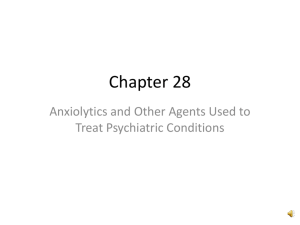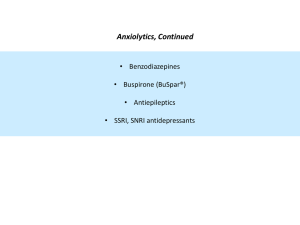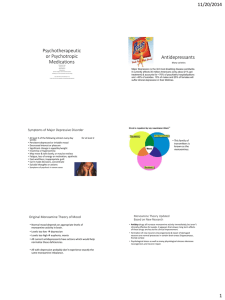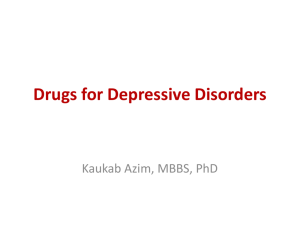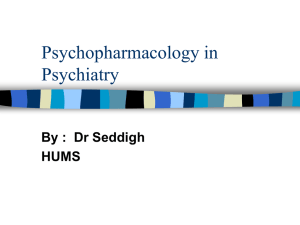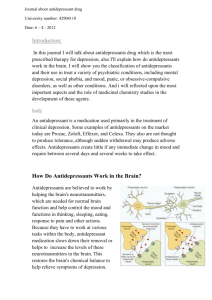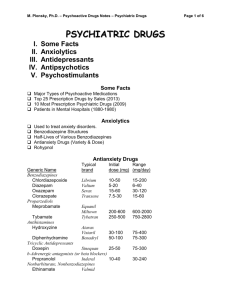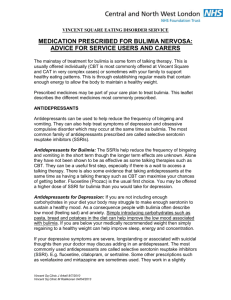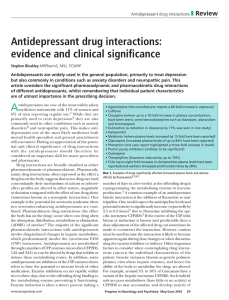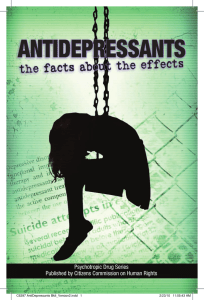Gomes, Amilcah (3) - Antidepressants.ppt
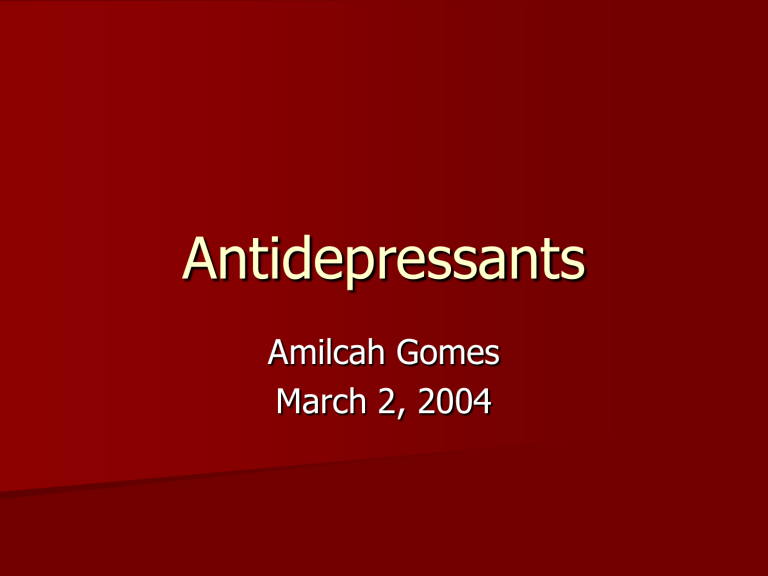
Antidepressants
Amilcah Gomes
March 2, 2004
Antidepressants
Types of Antidepressants
More About Tricyclics
More About SSRIs
More About MAOIs
Any side-effects?
Other Concerns
References
Types of Antidepressants
First-generation Antidepressants
– Tricyclics
Elavil, Endep, Anafranil, Prothiaden, Janimine, Tofranil,
Gamanil, Lomont
Second-generation Antidepressants
– Serotonin re-uptake inhibitors (SSRIs)
Celexa, Prozac, Sarafem, Luvox, Paxil, Zoloft
– Monoamine oxidase inhibitors (MAOIs)
Nardil, Parnate, Manerix
Others
– Serzone, Wellbutrin, Effexor, Remeron, Desyrel
More About Tricyclics
How Do They Work?
– Increase the brain's supply of norepinephrine and serotonin levels
– Encourages the flow of nerve impulses to return to normal.
– Do not stimulate the central nervous system or block monoamine oxidase.
Concerns
– Interfere with many other neurotransmitter systems and brain cell receptors, affecting nerve cell communication all over the brain
– The more neurotransmitter systems and receptors you affect, the more side effects a patient will have.
More about SSRIs
How Do They Work?
– Blocks serotonin reuptake sites in the brain synapse
– Safer in larger quantities than
Tricyclics
Concerns
– Cost ($2-$3 per pill) – older drugs not available
– Side effects
More About MAOIs
How Do They Work?
– Blocks monoamine oxidase (MAO) in the brain synapse inhibiting the destruction of seratonin
Concerns
– Also blocks tyramine, a molecule that affects blood pressure
– So when monoamine oxidase gets blocked, levels of tyramine begin to rise, too.
– Too much tyramine can be fatal.
Any Side Effects?
IMPORTANT WARNING:
– Studies have shown that children and teenagers who take antidepressants
('mood elevators') such as fluoxetine are more likely to think about harming or killing themselves or to plan or try to do so than children who do not take antidepressants. If your child’s doctor has prescribed fluoxetine for your child, you should watch his or her behavior very carefully, especially at the beginning of treatment and any time his or her dose is increased or decreased. Your child may develop serious symptoms very suddenly, so it is important to pay attention to his or her behavior every day. Call your child’s doctor right away if he or she experiences any of these symptoms: new or worsening depression; thinking about harming or killing him- or herself or planning or trying to do so; extreme worry; agitation; panic attacks; difficulty falling or staying asleep; irritability; aggressive behavior; acting without thinking; severe restlessness; frenzied abnormal excitement, or any other sudden or unusual changes in behavior. Your child’s doctor will want to see your child often while he or she is taking fluoxetine, especially at the beginning of his or her treatment .Your child’s doctor may also want to speak with you or your child by telephone from time to time.
Be sure that your child keeps all appointments for office visits or telephone conversations with his or her doctor. Talk to your child’s doctor about the risks of giving fluoxetine to your child.
Other Concerns
Drug Interaction
Pregnancy and Breast Feeding
Antidepressant Withdrawals
Other Depression Treatments
References
http://www.surgerydoor.co.uk/medical_co nditions/Indices/A/antidepressants.htm
http://www.nlm.nih.gov/medlineplus/drugi nfo/medmaster/a689006.html
http://www.news-medical.net/?id=7965
http://www.healthyplace.com/communitie s/depression/treatment/antidepressants/a ntidepressant_list.asp
